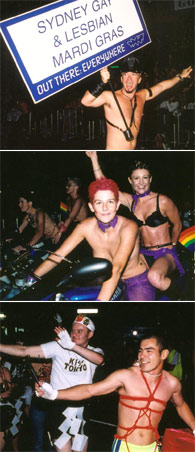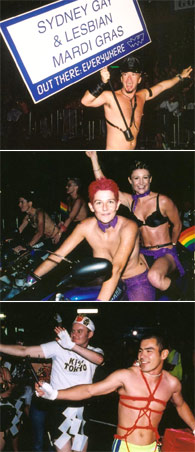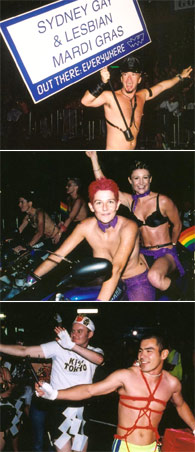Sydney is an interesting and unique city. Despite its reputation as a straightforward, laidback place where people mainly dance and go to the beach, it can be a frustrating and contradictory place that is hard to define, and sometimes, hard to like. Sydney gay life, in my opinion, is just as ambiguous - full of life in many ways, but stagnant and regressive in just as many others.

Mardi Gras will go ahead this year, it's twenty-fifth anniversary, after new sponsors jumped in at the very last moment, offering comparatively spartan financial support. Famously beginning as a fist-throwing street march, the Mardi Gras evolved in line with gay culture in general, becoming increasingly popular through the early eighties, and becoming a cultural lynchpin during the worst years of the AIDS epidemic.
By the mid nineties, it was one of the top tourist attractions in the country, bringing in hundreds of millions of tourist dollars, and attracting street audiences of almost one million people each year. The last few years, however, had seen it devoured by careerism and public ambivalence; like the gay community in general, the Mardi Gras lost its edge in early years of the twenty-first century.
Mardi Gras became something impressive to put on your PR or marketing resume: it was a sizeable bureaucracy that attracted million dollar sponsorships from corporations like Telstra (Australia's giant national telco) and Qantas, and staged dozens of huge events throughout the year. In one way, this kind of growth was great for Mardi Gras, and a good marker of how far the Sydney gay community had come since the seventies, but in another way, the whole thing bore very little resemblance to a pride building community focus, and looked and acted every bit like an insular organisation staffed by self-serving careerists and fabulous nobodies.
As well, the need for such a huge display of gay pride was lost on Generation Z, who'd grown up in the post-AIDS epidemic age, and who were young enough to be the grandchildren of the original Mardi Gras protest marchers. Dance party culture, huge in the nineties, has slid a bit out of vogue, and post-Olympics Sydneysiders of all sexualities need a little bit more than a drag show on the back of a truck to knock their socks off, entertainment wise.

The buzz of places like Singapore, Bangkok, Hong Kong, and every American or European city comes not just from the cities themselves, but the 24-7 criss-cross of tourists and business people from all over the world. Go to a bar in Bangkok, you'll meet a German traveler, a Dutch couple, someone from Japan, a group from Cyprus and a bunch of Australians. Same story in London, Singapore, and pretty much every other big city. Endlessly topped up by foreign visitors, city nightlife in most parts of the world is exciting, international, and runs seven days a week.
Isolated Sydney is not the same. Australia is on the way to nowhere, at the end of the line, and the only cities within a entire-day drive are Brisbane are Melbourne. Flying, the metropolises of New Zealand are only a couple of hours away, while the delights of Adelaide, Perth, Canberra and Darwin are accessed by daily Qantas flights. Asia is eight-nine hours away by plane; fares are high.
Monday to Wednesday, most places are empty - main streets are quiet and ghostly by 10pm. On the weekend, things pick up, but you're still meeting people form this part of Sydney, or that part of Sydney, and the odd visitor from Melbourne or Brisbane. Every Mardi Gras, Sydney guys excitedly and loudly tell each other - and anyone else in earshot - that they "met an American" or "met a Canadian" or "met a German" and for two or three weeks of the festival, Sydney actually starts to look like what it would look like if it wasn't stuck on the edge of the earth.
Despite this, Sydney's gay scene is fairly large, and one of the most sophisticated in the Asia Pacific region.
Unlike European style Melbourne, with it's hidden clubs and bars and restaurants scattered all over the city, centric Sydney likes to keep everything together in one place. Having most clubs and other gay venues on one or two big streets is handy, and good for business - all your patrons come to the same street, and so you know you're on a winner if you open a gay-friendly late night cafe between two popular gay bars, and you know you're likely to get laid if every single person in a four block radius is gay.
It all seems like a good idea, and in a macho big city like Sydney, the chances of a gay bar springing up on its own in an outlying suburb are slim - in fact, this has never happened, so let's say zero. The problem with it is that it ends up a bit like a theme park, or a zoo. The gay scene becomes a bit like Chinatown - instantly identifiable, popular with gawking tourists, and contained within a strict border. Both ends of Oxford Street are a bit like demilitarised zones - you can look up and see the rainbow flags, but your chances of bumping into a couple of guys holding hands decreases very sharply the second you step away from the middle two or three blocks of Oxford Street. Newtown's King Street has emerged as a secondary gay area, popular with people who aren't as financial as they'd like to be, or who aren't so interested in the hyper-commerical Oxford Street rat race.

The gay political presence in Sydney is quite notable, and the state of gay civil rights is superior to that of most other cities, especially those in the Asia-Pacific region. Sydney, like Australia in general, has a wonderful sense of middlebrow balance. There's progressive thought and radical city scenes, without the right wing lunatic fringe of neo-Nazi killers and bashers that lurk in European cities. Legislative change is an uphill battle, but it doesn't face the powerful religious groups of the US, or that country's inherent conservatism. One of Australia's High Court justices, Michael Kirby, is openly gay, as is Bob Brown, the leader of Australia's increasingly popular alternative political party The Greens.
Having said that, gay marriage is not recognised in Australia, and gay adoption is a thorny area too. Stranger things have happened, but I can't see an openly gay man becoming mayor of Sydney, as is the case in Paris and Berlin. Gay officials, like the ones mentioned above, enjoy wholesale public respect and acceptance, but only, it seems, because their positions are so impersonal, and remote. Gay faces are rare in lesser public positions in Australia, and Australian pop culture keeps gay celebrities at a distance.
Sydney is a vibrant city, and it has what is by far the most organised and liberal gay centre in the Asia-Pacific region. The ball and chain for this old penal colony, though, is its geographical distance from the rest of the world, which inhibits its ability to really integrate itself into northern hemisphere trends. It is definitely going through a slump at the moment, which was unexpected after the triumph of 2000 (ie: the Olympics), and in some ways, this silver anniversary year of Mardi Gras is as uncertain and tenuous as the first.











 Printable Version
Printable Version









